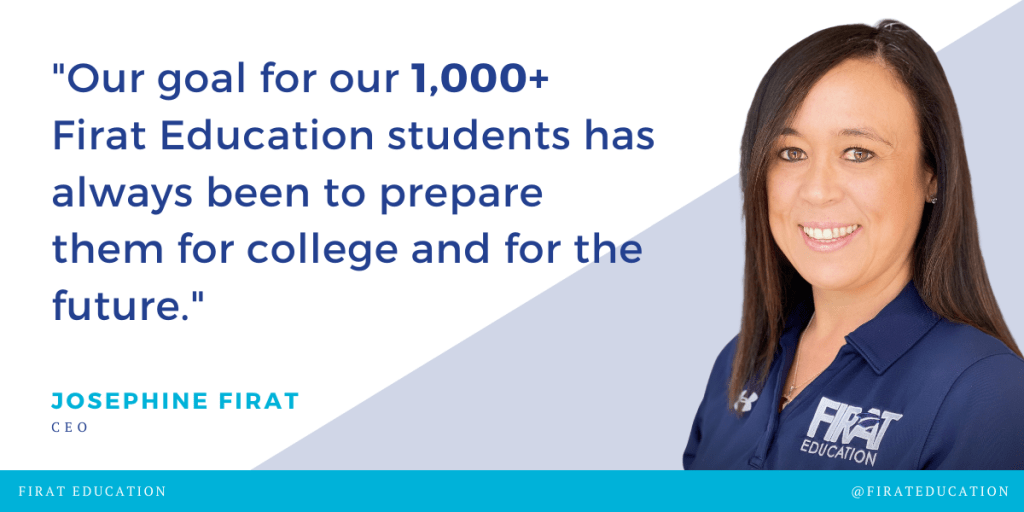
I usually leave the blog posting to the education experts at Firat Education, but I felt compelled to write one about remote learning. Ibrahim and I have a rising 3rd grader. Our seven year old, like all other students across the world, was thrown into remote learning in March. During the quarantine, we didn’t teach him math, english, or reading. While those subjects mattered, other things mattered more: how he could manage his time, use his laptop, log on to Zoom, send proper emails to his teachers when he had questions, and much more… All. By. Himself.
We’ve been asked as parents what we plan do with our, now eight year old. Because we own an education company, maybe we have some sort of perspective? Well, we do. It has nothing to do with virtual learning, masks, pods, or COVID-19. It has to do with our kids. Since March, we have seen that families need support in a variety of ways, and we’ve noticed a gap. There are many students who have the ability to learn independently but don’t know how.
Again, I’m not talking about math, english, or reading. I’m talking about independent learning. Independent learning doesn’t just help with the now during the Covid-Era, but with academic goals, college goals, and future goals. Firat Education has consulted over 1,000 students in 12 years. Our goal for those 1,000+ students has always been to prepare them for college and for the future.
A little fun fact is that our original logo back in 2008 has a slogan: “Educating our future with solutions for life.” (The evolution of our logo is a whole other blog post.)

Our strengths lie in preparing kids – of all ages – for college and for life. We believe that starts with teaching “entrepreneurial-thinking” skills to foster independent learning in students, even as young as seven years old.
What are “entrepreneurial-thinking” skills? In short, it is the ability to recognize problems and provide solutions. Those skills include communication, time management, tenacity, organization, innovation, problem solving, flexibility, vision, ownership, curiosity, self-motivation, and self-care.
With those skills, our students, at ANY age, can be successful independent learners. And these skills are vital, now more than ever, because when our kids are not learning independently, we, as parents, are adversely affected too: no mom wishes her 16 year old still need her approval to schedule a meeting with his counselor. We want that 16 year old to know his schedule, move things around as needed, and have the confidence to schedule/cancel/reschedule and “own” the outcomes, not at 16 years old, but at six, seven, eight…
We, at Firat Education, have put together a program for families. Learn more about Independent Learning Support and contact us to get started. While we did drop the slogan from our logo, we have not wavered from our original mission – to educate our future with solutions for life.

Yours,
Josephine Firat
CEO, Firat Education
On February 26, 2013, in an email to 6,000 member schools, The College Board – administrators of the SAT® – announced plans “to redesign the SAT so it better meets the needs of students, schools, and colleges at all levels.”
At this point, few specifics are known. Here’s what we do know:
* Given the proposed scope of change, this will not impact the class of 2013, 2014 or 2015, as the earliest that an overhauled SAT could launch would be Spring 2015, which would impact today’s freshmen. But there has not yet been a date released for the launch of the proposed new test.
*Something to note: the last time the SAT changed, in 2005, we saw the PSAT change first in October of 2004. As the PSAT is intended as the preliminary SAT for test takers, it will be worth watching to see if the PSAT changes first this time as well (in October 2014).
*The stated objective of the test change is to improve the SAT to “strongly focus on the core knowledge and skills that evidence shows are the most important to prepare students for the rigors of college and career.”*
*David Coleman, the new head of the College Board, has stated that he would like to add source material for students to analyze in the SAT writing section, but this has not yet been confirmed.
What does this change mean to you even if it may “seem” like you or your loved ones are “not impacted” based on the timeline and College Board’s statement above? Let me put it this way: EVERYBODY IS IMPACTED by this change no matter what unless you are already a senior who is done with testing and on your way to college applications.
One and only reason, which is kind of obvious, is that colleges know that this change is coming, which already trigerred (if it did not so before College Board made its decision to change the SAT) that SAT is indeed NOT the best measure to gauge students’ academic strength. How many successful leaders who finished great colleges do you know got to where they are with “unfathomable” vocabulary? (let me guess, at least 98% of you looked up the word, unfathomable, which is indeed a very commonly tested SAT word in the Reading section). ACT has gained significant grounds in the last decade because of this very reason. Therefore, I suggest do not bank on your 2250 SAT score, but take the ACT, as well, and submit both scores! This way, you will prove to colleges that it is not about how much you can memorize, but it is about how much fundamentals matter in core subjects.
This means, you cannot afford not to include the ACT in your testing plans until we know the change College Board is planning is indeed a good one…. Those of you who are currently in middle school, you will have both the new SAT and the ACT to choose from, but anyone who is older, you really only have one: Go with ACT, at least once.
